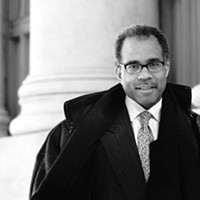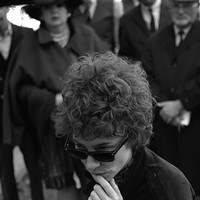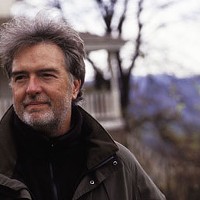

Page 3 of 6
If a star went to the hospital, TV stations would ask Osborne to appear and provide a career overview for the evening news. And no matter how many stars he met, he never seemed starstruck.
"I could watch Lana Turner arrive at a premiere and be so impressed because it was like, 'Oh my God, this great star is coming to a premiere.' And then I could have dinner with her the next night, and I wouldn't mix the two up."
After Turner Classic Movies launched in 1994, a task force was established to find someone who could host the prime-time lineup. At the time, Osborne was being courted by the dominant American Movie Classics for a daytime hosting job.
But, according to former TCM executive vice president and GM Tom Karsch, TCM offered something else: "Yes, to be in fewer homes, but it was to host movies he cherished -- and to be in prime time instead of daytime."
Karsch remembered Osborne from back in the 1980s, when Karsch worked for Showtime and Osborne at Showtime's sister network, The Movie Channel. "We even shared the same hairstylist," Karsch recalls over coffee. Karsch, who'd joined TCM within its first year, thought it was a perfect move.
"Robert is incredibly warm, incredibly gracious," says Karsch, who left TCM last spring when Koonin added TCM to his duties. "Any stranger that comes up to him, and you can imagine how many people come up to him with all sorts of oddball trivia or anecdotes, he treats everyone like they're very important people. When you come across a person like that, you want to jump on him. Ann Miller once said during an interview with him, 'You know my career more than I do!'"
Armed with Osborne's cache and Ted Turner's MGM/UA library, TCM went after AMC, and after some initial struggles caught up with the network in cable subscription. By late 2002, AMC had stopped trying to compete in the classics market, started adding commercials and now focuses on original programming such as the Golden Globe-winning "Mad Men."
But one thing AMC never had was Osborne, with his connections as a columnist and with the Academy of Motion Pictures Arts and Sciences; while he's been the official greeter at the Oscar ceremonies' red carpet only recently, Osborne has produced an updated coffee-table book on the awards for the past two decades since the 1980s. His next update, 80 Years of the Oscar: The Official History of the Academy Awards, is due out on Abbeville Press in September.
He has become synonymous with Oscars, and the movies, and AMC was never able to top that.
"There's a casualness to Robert," Karsch notes. "The attempt by the network from the very beginning ... there already was AMC, which had positioned itself as nostalgic, like going to the Fox Theatre with all that red velour ... so when we launched we said, 'We'll be the hip guys. We're going to do this in a way that doesn't turn off an older person. We're going to do it with a freshness, like a club that you want to be a member.'"
Steve Koonin is known for thinking big when it comes to branding. This is the man who, near the end of his tenure at Coca-Cola, wanted to celebrate the new millennium by projecting the Coke logo via laser to the moon.
Over his years at Turner, Koonin helped oversee the successful rebranding of TNT as the drama network and TBS as the comedy network. After he was named president of Turner Entertainment Group last year, Koonin turned CourtTV into TruTV and the local Atlanta station TBS into Peachtree TV. Turner Broadcasting CEO Phil Kent added TCM to Koonin's duties, which sparked a departure of some top TCM executives. Koonin won't go into details about the exodus. But as someone who had to deal with similar corporate shake-ups at Coke "on a weekly basis," he saw the change as a necessary business move.
"I don't think it's appropriate to talk about why we made contraction decisions," says Koonin, who adds that he saw "redundancies" in TCM management. "How many senior marketing folks do you need? How many senior on-air people do you need? The reason we constantly work with people and develop people is so they can work on a multitude of brands.
"I don't think that there's been substantive management changes," Koonin continues. "One or two. I don't think it's substantive in a world of 60-plus employees."
Within a few weeks, Karsch, the head of TCM since 1995, was gone. So were Katherine Evans, senior vice president for marketing and enterprises; Shannon Davis, senior vice president for on-air packaging and original programming; and Chris Merrifield, vice president and creative director for TCM on-air creative.


